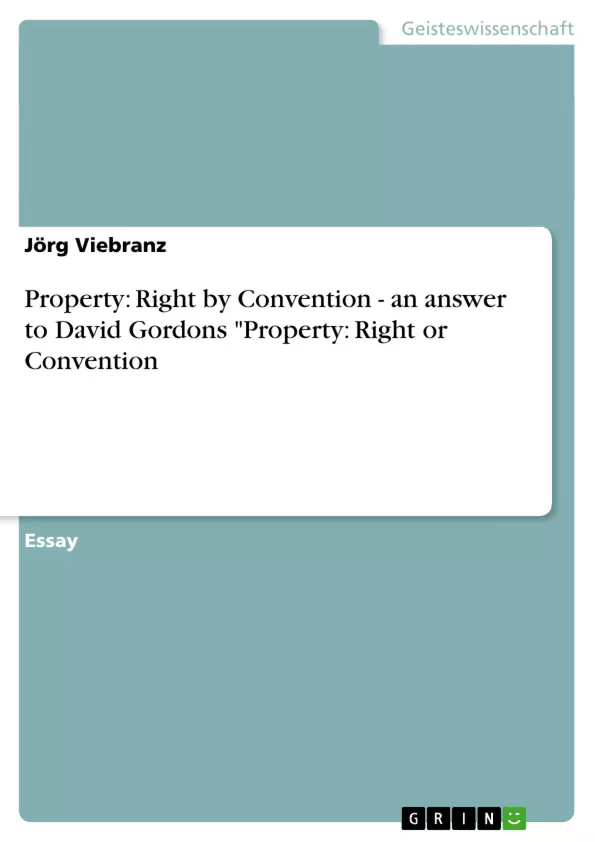In his article „Property: Convention or Right?” (the Mises Review, Volume 8, Number 2, April 2003) David Gordon criticises Liam Murphy’s and Thomas Nagel’s (M&N) argument that private property is a convention defined by the legal system and therefore property and the influence of taxation on this property cannot hold its ground as a baseline for the evaluation of taxation.
Gordon’s main argument against this claim is that property rights are absolute rights, i.e. rights without duties or restrictions, and he tries to show with an example that M&N confuse legal with moral (or absolute) rights. I doubt that he succeeds in his attempt. In this essay I will show that property rights indeed are not absolute but conventional and that therefore Gordon’s argument is pointless. I will show that even Gordon has to accept the fact that property rights are conventions and that this is coherent with libertarian mainstream thinking. I will also show that M&N’s argument for taxation is reasonable and that as long as there is a government (and there has to be a government if we want to live in a civilized and technologically advanced society) taxation is just and not “legalized theft”.
Inhaltsverzeichnis
- Einleitung
- Das Argument von Murphy und Nagel
- Gordons Kritik
- Das Konzept der Konventionen
- Die Lockean Proviso
- Fazit
Zielsetzung und Themenschwerpunkte
Dieser Essay setzt sich kritisch mit David Gordons Argumentation auseinander, die sich gegen Liam Murphys und Thomas Nagels These richtet, dass Privateigentum eine vom Rechtssystem definierte Konvention ist. Der Essay untersucht die Natur von Eigentumsrechten und ihre Bedeutung für die Rechtfertigung von Steuern.
- Die konventionelle Natur von Eigentumsrechten
- Gordons Verständnis von absoluten Eigentumsrechten
- Die Rolle des Staates bei der Schaffung von Eigentumsrechten
- Die Rechtfertigung von Steuern aus libertärer Perspektive
- Die Lockean Proviso als Grundlage für Eigentumsrechte
Zusammenfassung der Kapitel
- Einleitung: Der Essay stellt das Thema und die Argumentationslinie des Autors dar. Er führt die zentralen Akteure und ihre Positionen ein und kündigt seine eigene Position an, die im Widerspruch zu Gordons Argument steht.
- Das Argument von Murphy und Nagel: Dieser Abschnitt fasst die Kernaussagen von Murphy und Nagel zusammen. Sie argumentieren, dass Privateigentum eine rechtliche Konvention ist, die von einem Staat geschaffen wird, der für die Aufrechterhaltung von Ordnung und Wohlstand unerlässlich ist. Daher sei der Staat berechtigt, Steuern zu erheben, da er an der Entstehung des Reichtums beteiligt ist.
- Gordons Kritik: Dieser Abschnitt analysiert Gordons Gegenargument, das auf der Annahme absoluter Eigentumsrechte basiert, die unabhängig vom Rechtssystem bestehen sollen. Gordon sieht Steuern als unrechtmäßige Einmischung in diese Rechte.
- Das Konzept der Konventionen: Der Essay argumentiert, dass Gordons Verständnis von Eigentumsrechten als absolute Rechte nicht haltbar ist. Er zeigt auf, dass auch libertäre Denker wie Robert Nozick in ihren Theorien Einschränkungen von Eigentumsrechten akzeptieren, beispielsweise durch die Lockean Proviso.
- Die Lockean Proviso: Dieser Abschnitt erläutert die Lockean Proviso, die eine Bedingung für die gerechtfertigte Aneignung von Eigentum darstellt. Die Proviso stellt sicher, dass ausreichend Ressourcen für andere verfügbar bleiben und verhindert eine ungerechte Konzentration von Eigentum in den Händen weniger.
Schlüsselwörter
Dieser Essay konzentriert sich auf die konventionelle Natur von Eigentumsrechten, die Rechtfertigung von Steuern, die Lockean Proviso, libertäre Philosophie, Robert Nozick, Murphy und Nagel, David Gordon, Staat und Eigentum.
Häufig gestellte Fragen
Sind Eigentumsrechte absolute moralische Rechte?
Nein, der Essay argumentiert, dass Eigentumsrechte konventionell sind und durch das Rechtssystem eines Staates definiert und eingeschränkt werden.
Ist Besteuerung „legalisierter Diebstahl“?
Der Autor widerspricht dieser libertären Ansicht und argumentiert, dass Steuern gerechtfertigt sind, da der Staat den Rahmen schafft, der Privateigentum erst ermöglicht und schützt.
Was besagt die „Lockean Proviso“?
Sie ist eine Bedingung für rechtmäßiges Eigentum: Man darf sich Ressourcen aneignen, solange „genug und ebenso Gutes“ für andere übrig bleibt.
Wie begründen Murphy und Nagel die Rechtmäßigkeit von Steuern?
Sie sehen Privateigentum als rechtliche Konvention. Da der Staat die Ordnung für den Wohlstand garantiert, kann das Vorsteuer-Einkommen nicht als moralische Basis für Eigentum gelten.
Benötigen wir einen Staat für eine zivilisierte Gesellschaft?
Der Autor vertritt die These, dass ein Staat notwendig ist, um in einer technologisch fortgeschrittenen und zivilisierten Gesellschaft Eigentumsrechte effektiv zu verwalten.
- Quote paper
- Jörg Viebranz (Author), 2003, Property: Right by Convention - an answer to David Gordons "Property: Right or Convention, Munich, GRIN Verlag, https://www.grin.com/document/40466



